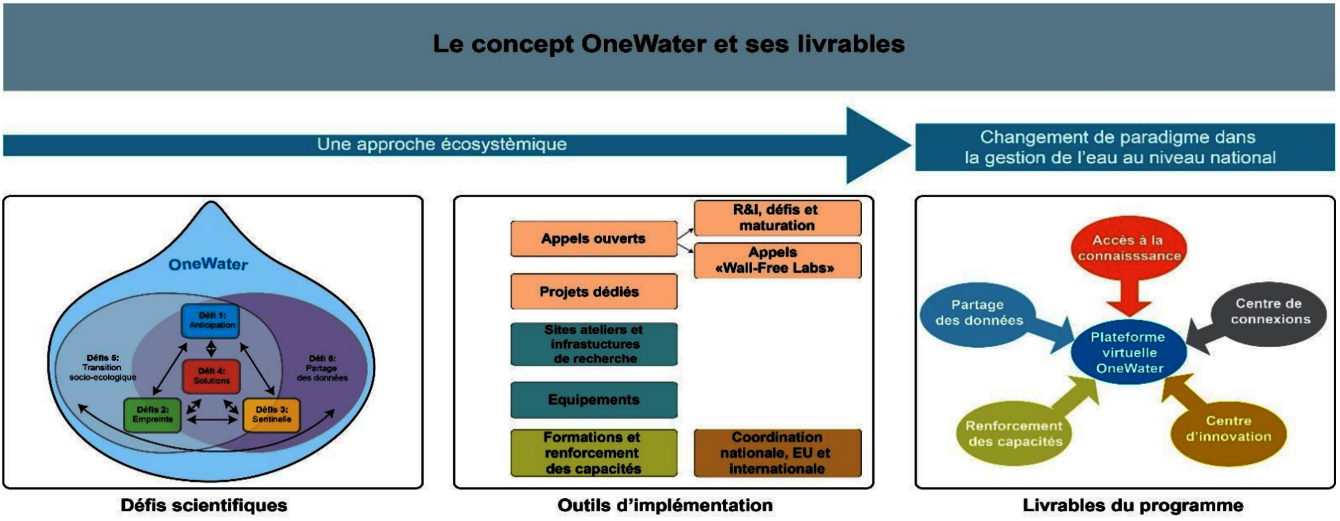We are pleased to inform you of the launch of the OneWater / Water for All Programme
To view the press release
Vous êtes ici :
We are pleased to inform you of the launch of the OneWater / Water for All Programme
To view the press release
Nous sommes ravis de vous informer du lancement du premier appel à projet OneWater - Eau Bien Commun. Il est ouvert à l’ensemble des chercheurs issus d’établissements français d’enseignement supérieur et/ou de recherche souhaitant proposer des contributions pour répondre aux objectifs du PEPR exploratoire OneWater.
Portant sur les 6 Défis et Inter-Défis du programme, cet appel, mis en ligne le jeudi 5 mai par l'ANR, se déroulera selon deux phases :
Pour accéder aux attendus, modalités et documents de soumission de ce premier appel à projet
With global change, natural and anthropogenic pressures on water resources are exacerbated and become a major challenge for our societies in the 21st century: it is urgent to act now and at all levels.
Water is a common good essential to life and socio-economic development. It is a resource, a living environment, a vital element for climate regulation, ecosystem functioning and human development. France was a pioneer in the world in setting up river basin governance, but the assumption that everything could be resolved at the basin level is being eroded. The global is catching up with the local and new issues are emerging. These challenges must be addressed by more integrated, systemic, multi-actor approaches to co-construct solutions adapted to contrasting realities. Over a period of 10 years, this programme aims to change the paradigm by placing water as a common good, a central element of socio-ecosystems subject to climatic and anthropic forcing.

Cross-cutting challenge 5 - Support the socio-ecological transition towards a new governance of resources for a sustainable and resilient society. To develop a renewed management of water resources and their uses by reexamining established models and systems in order to make them evolve. To co-produce innovative governance models considering water as a common good. To develop original tools and approaches for a socio-ecological transition including the different uses and protection systems of water resources. Rely on the science of sustainability for a real paradigm shift.
Cross-cutting challenge 6 - Share, make accessible and understandable by all water data for knowledge and action. To support strategies and decision making with knowledge through the organisation and sharing of data from different sources. To build on existing knowledge, re-interrogate it and promote new knowledge where appropriate. To support the appropriation of data and services by the different actors (from scientists to managers...). Make data easy to find, accessible, interoperable and reusable (FAIR). Offer a single platform dedicated to "water" data.
This transforming programme will have direct and significant impacts on the development of societies and territories:
OneWater proposes a national strategy (Metropolitan France, overseas territories) adapted to the needs of living organisms and water users, associating the water sector and territorial actors, in order to consolidate French world leadership. It enables the funding of innovative and structuring research to strengthen interdisciplinary and multi-actor dialogues, thanks to various tools:
CNRS, BRGM and INRAE are co-leading OneWater and rely on partners with complementary and recognised skills. They will be represented on the institutional strategic committee, in conjunction with the three institutional leaders. The team of three co-directors also relies on a programme committee organised around the challenges, an international scientific committee and a Think Tank made up of stakeholder representatives to respond to these major issues and generalise the notion of water as a common good.
IFREMER, IRD, Météo France, Bordeaux University, Claude Bernard Lyon 1 University, Montpellier University (Stratégie de site I-MUSE), Grenoble-Alpes University, Rennes 1 University, Strasbourg University (Responsable: Gwenaël Imfeld <imfeld@unistra.fr>, FERED), Toulouse Midi-Pyrénées federal university.
Agathe Euzen : agathe.euzen@cnrs.fr
Dominique Darmendrail : d.darmendrail@brgm.fr
Thibault Datry : thibault.datry@inrae.fr
OneWater, an exploratory PEPR of the Investissements d'Avenir plan (PIA4)
Priority research programmes and equipment (PEPR) aim to build or consolidate French leadership in scientific fields considered as priorities at national or European level and linked to a large-scale transformation. The "exploratory" PEPRs target emerging sectors with research work whose fields of application may still be in the realm of working hypotheses. The aim is to explore scientific fields with potentially multiple spin-offs.